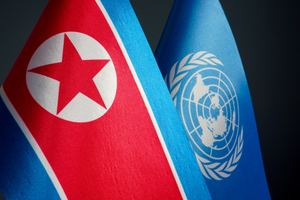 Flags of North Korea and the United Nations. (123rf)
Flags of North Korea and the United Nations. (123rf) The UN General Assembly’s Third Committee on Wednesday approved a North Korean human rights resolution by consensus, with South Korea and the United States listed as co-sponsors.
The decision marks the first such resolution under the Lee Jae Myung administration and the second under US President Donald Trump’s administration.
The plenary session quickly moved through the resolution, though China and Russia said they would dissociate themselves from the consensus, echoing North Korea’s rejection. Delegates from the US, Japan and the European Union, among others, defended the measure as essential and well-founded.
The Trump administration, which was not listed as a co-sponsor on the draft released Nov. 4, only added the US to the co-sponsor list during the plenary session on Wednesday.
The move came despite Trump’s moves to pull Washington back from UN human rights mechanisms during his second term, including a February executive order that withdrew the US from the UN Human Rights Council.
The UN resolution, which highlights the severity of North Korea’s human rights situation and calls for concrete steps to improve conditions inside the country, was also a test for the Lee administration.
Despite concerns that Lee’s government might recalibrate its stance in line with its engagement-focused North Korea policy, South Korea placed its name on the draft from the outset.
South Korea was absent as a co-sponsor under the liberal Moon Jae-in administration from 2019 to 2021, when inter-Korean rapprochement was a priority, but returned to co-sponsorship under the Yoon Suk Yeol administration in 2022.
After the adoption, the Foreign Ministry in Seoul said Thursday that “the ROK government will continue its close cooperation with the international community for the substantive enhancement of human rights of DPRK people,”
The ROK and DPRK stand for the respective official names of South and North Korea: the Republic of Korea and the Democratic People’s Republic of Korea.
According to Seoul’s Foreign Ministry, a total of 61 UN member states jointly sponsored the North Korean human rights resolution. The resolution is scheduled for final adoption at the UN General Assembly plenary in December.
“The United States is pleased to co-sponsor and vote in support of this important resolution,” a US representative said on behalf of the administration after adding Washington’s name to the co-sponsor list.
“The resolution … expresses grave concern about the worsening humanitarian situation in the DPRK due to the regime’s policies and practices that cause its people to endure avoidable hardship and suffering, including malnutrition.”
A Chinese delegate responded immediately.
“It is neither impartial nor objective, and it does not reflect the reality in the DPRK, including the negative impact of sanctions on its humanitarian situation,” the official said. “For these reasons, China dissociates itself from the consensus on the draft resolution.”
A Russian representative also said, “The Russian Federation dissociates itself from the consensus on the document.”
Japan pushed back against the arguments raised by China and Russia.
“We continue to strongly urge Pyongyang to take seriously the views of the international community as expressed in this resolution just adopted,” Kazutaka Kawahara, minister at the Japanese permanent mission to the UN, said.
The Third Committee has adopted a North Korea human rights resolution every year since 2005, and this year’s text largely follows the tone and substance of the version passed by the General Assembly last year.
The UN resolution reaffirms that North Korea’s leadership bears responsibility for preventing and addressing crimes against humanity and ensuring that perpetrators are brought to justice under international law.
It also calls on Pyongyang to allow the return of diplomatic missions, UN agencies and civil society groups as its borders gradually reopen, and stresses the importance of engagement, including inter-Korean dialogue.
dagyumji@heraldcorp.com
